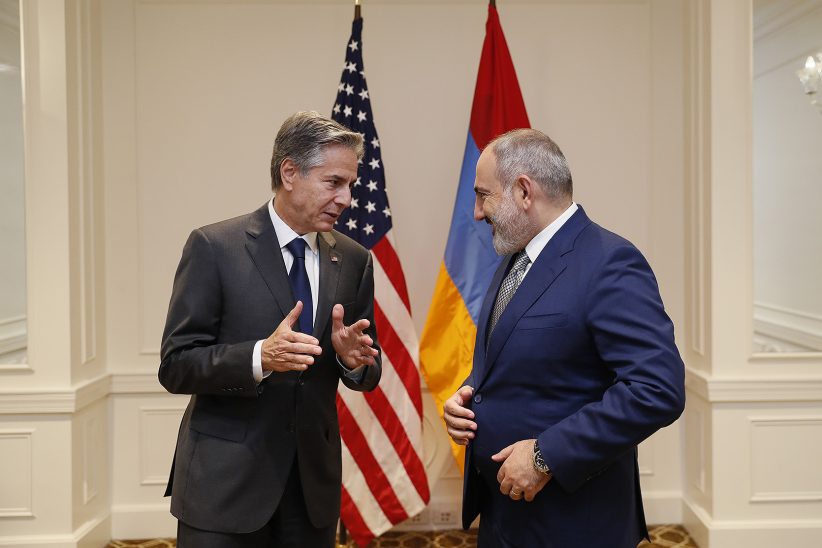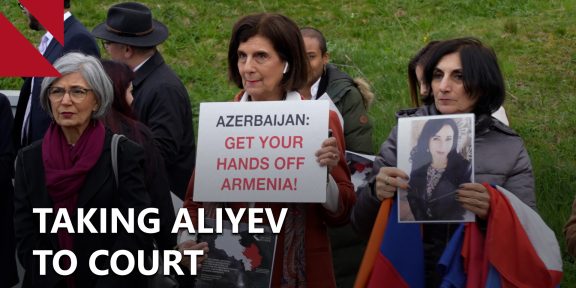By Emilio Luciano Cricchio
As Azerbaijan’s blockade of Nagorno-Karabakh approached its 100th day, CivilNet sent questions earlier this month to the U.S. State Department and Agency for International Development about Washington’s role in the region. CivilNet presents the U.S. government’s responses below, which were sent by the Press Office lightly edited for length and clarity where necessary.
A State Department spokesperson’s responses
–
Q: Many analysts have been pointing to increased engagement by the United States in the South Caucasus. US Secretary of State Antony Blinken has taken an active role in mediating between Armenia and Azerbaijan. Former House Speaker Nancy Pelosi paid a historic visit to the country in the aftermath of the major attack by Azerbaijan on Armenia in mid-September 2022. Can greater US engagement allow for better access and operations by humanitarian organizations, including USAID, to Armenia?
- As the Secretary has emphasized, the United States is committed to Armenia-Azerbaijan peace negotiations. Direct dialogue is key to resolving issues and reaching a lasting peace. There is not a military solution to this conflict. We continue to facilitate discussions between Armenia and Azerbaijan; bilaterally, with partners, and through multilateral organizations, to help overcome obstacles to a peace agreement.
- The decades-long conflict has deeply affected civilian populations in both Azerbaijan and Armenia and needs to end.
- The U.S. government has a long-standing commitment to aid to displaced populations in the South Caucasus. We are currently funding $2 million in humanitarian demining activities in the conflict area.
Q: The United States has commended Armenia’s democratic reforms, reforms that are taking place in a volatile region. But, with Armenia’s numerous security challenges, the country’s democratization is at risk. There is a perception that authoritarian states support each other, and prop each other up. Shouldn’t the world’s democracies do the same? How does the world arrive at peaceful coexistence if both sides of a conflict don’t live by the same rules?
- The United States is committed to continue helping the Armenian people build a future, a path they chose in 2018 and to which they recommitted themselves during the 2021 parliamentary election. Our shared democratic values are the bedrock of our relationship.
- Armenia’s participation in the 2021 Summit for Democracy was a recognition of Prime Minister Pashinyan’s commitment to democratic reforms. While more needs to be done, the Prime Minister has demonstrated his commitment to reform in his efforts to combat corruption in Armenia. We look forward to further discussions along these lines and on other democratic reforms Armenia is pursuing at the second Summit for Democracy happening at the end of the month. Ultimately, a strong, democratic Armenia will be in a better position to freely choose its own partners and allies.
Q: You have called for travel to be restored along the Lachin corridor, the only route between Armenia and Nagorno-Karabakh. As has the Intl Court of Justice. Does this strengthen your hand to try to do more than just helping the refugees who are stuck in Armenia?
- The Secretary raised the Lachin corridor in his engagements with Prime Minister Pashinyan and with President Aliyev in Munich February 18 and during calls with the leaders on March 20 and 21.
- The Secretary underscored the need for free and open commercial and private transit through the Lachin corridor. He also called on the parties to open other transportation routes.
Q: The former NATO head Anders Fogh Rasmussen has said ethnic cleansing is the red line. That is – overt, violence and pogroms. But slow ethnic cleansing such as this blockade – is that a red line?
- The United States is concerned about the long-term implications of impeded traffic through the Lachin corridor and has raised these concerns directly with President Aliyev on multiple occasions.
- The way forward for all issues is through negotiations. The United States remains committed to supporting a lasting peace.
–
USAID’s spokesperson’s responses
–
- We are concerned about the worsening humanitarian situation in Nagorno-Karabakh.
- The ongoing obstruction of normal commercial and private travel along the Lachin corridor is causing shortages of food, fuel, and medical supplies and can potentially cause a significant humanitarian crisis.
- The United States calls for the full restoration of free movement through the corridor, including commercial and private travel. The United States also calls on the parties to open other transportation routes.
- The way forward for all issues is through negotiations. The United States remains committed to supporting a lasting peace.
- We continue to monitor the situation and assess ways to get assistance to the population living in this area.
- USAID provides humanitarian assistance based on assessed need that is beyond the capacity of other local and international actors, including regional governments, to provide on a timely basis. We are in close communication with ICRC, the UN, our Department of State colleagues, and other partners as we continue to monitor and assess the situation.
- On average, USAID responds to 75 crises in more than 70 countries every year, providing humanitarian aid to tens of millions of people after disasters strike, including in Northern Ethiopia, Syria, and other challenging contexts. We will continue to work with our partners to provide humanitarian assistance to millions of people around the world.
















